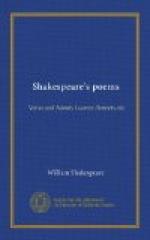|
This section contains 6,542 words (approx. 22 pages at 300 words per page) |

|
SOURCE: Shohet, Lauren. “Shakespeare's Eager Adonis.” Studies in English Literature, 1500-1900 42, no. 1 (winter 2002): 85-102.
In the following essay, Shohet illuminates the distinctive oppositional modes of desire articulated by the title characters of Venus and Adonis.
In Shakespeare's Venus and Adonis, when Venus solicits Adonis, he famously turns away. Venus entreats:
“Vouchsafe, thou wonder, to alight thy steed, And rein his proud head to the saddle-bow; If thou wilt deign this favor, for thy meed A thousand honey secrets shalt thou know.”(1)
Adonis rebuffs her, because “Hunting he lov'd, but love he laugh'd to scorn” (line 4). The critical tradition has discussed in great detail Adonis's refusal to love.2 But, importantly, this line does not begin with a refusal. Rather, it introduces Adonis with a positive predicate: he “loves” hunting. Moreover, the “but” that conjoins his predilection for hunting with his antipathy to love has dialectical overtones: Adonis would seem...
|
This section contains 6,542 words (approx. 22 pages at 300 words per page) |

|


